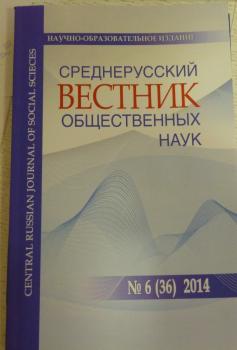The article presents the results of a study of political activity and electoral behavior of today´s youth, Vladimir Region. Based on neoinstitutional approaches related to the theory of rational choice, the author focuses on individual and subjective factors of the political process, especially on the issues of political values. The study allowed to formulate the basic contradictions and conclusions required for the formation of the state electoral politics. The research has shown that young people are aware of the importance of democratic values; however, they are not ready to support them in practice, giving priority to the state. The study found a strong distrust of young people in the modern Russian political parties. However, young people are interested in politics, would like to understand more about it, but do not know where to get reliable information; there is no place and noone to discuss politics. On this basis, the article concluded that the involvement of modern urban youth in the political process is extremely low. The study allowed the author to propose a number of measures to overcome the political passivity of young people and attract them to participate in the elections, especially - to ensure the semantic content of the election process and the formation of meanings participation of young people.
election, government, youth, state electoral politics
1. Avtsinova G.I., Voronina E.Yu. Innovatsionnye formy protestnoy aktivnosti molodezhi. Politbook. - 2014. - № 3. - S. 15-26.
2. Vovlechenie molodezhi v zhizn´ obshchestva. Prezentatsiya gipotezy rossiyskogo nauchnogo issledovaniya: Kollektivnaya monografiya / Pod red. d-ra ped.n., professora S.S. Gilya. - M.: Izdatel´stvo RGSU, 2007. - T.1. - 314 s.
3. Grishin N.V. Gosudarstvennaya elektoral´naya politika: predmetnaya oblast´ novogo nauchnogo napravleniya. Kaspiyskiy region: politika, ekonomika, kul´tura. - 2014. - № 3. - S. 71-82.
4. Eliseev A.L. Patrioticheskoe vospitanie v vuzakh kak prioritetnoe napravlenie gosudarstvennoy molodezhnoy politiki (regional´nyy opyt). Vlast´. - 2015. -№ 6. - S. 57- 63.
5. Evstifeev R.V. Issledovaniya elektoral´nykh protsessov i elektoral´nogo prostranstva kak osnova realizatsii elektoral´noy politiki. Uchenye zapiski. Vladimirskiy filial RANKhiGS. - 2016. - №1 (17). - S. 16-19.
6. Kirdyashkin I. V. Tsennostnyy aspekt politicheskoy sotsializatsii molodezhi. Izvestiya Altayskogo gosudarstvennogo universiteta. - 2009. - № 4-1. - S. 272 - 274.
7. Komarova M.S. Molodezh´ kak ob´´ekt gosudarstvennoy politiki: spetsifika formirovaniya obshchestvenno-politicheskogo potentsiala. Srednerusskiy vestnik obshchestvennykh nauk. - 2015. - №6 (10). - S. 147-151.
8. Malik E.N., Mel´nikov A.V. Stanovlenie politicheskoy sub´´ektnosti rossiyskoy molodezhi v usloviyakh sovremennosti. Srednerusskiy vestnik obshchestvennykh nauk. - 2015. - №2 (38). - S. 70-75.
9. Merkulov P. A., Malik E. N., Budarina K. A. Institutsionalizatsiya molodezhnykh organizatsiy i ob´´edineniy v sovremennoy Rossii: problemy i perspektivy. Vlast´. - 2015. - №4. - S.140- 145.
10. Omel´chenko E.L. Molodezhnyy aktivizm v Rossii i global´nye transformatsii ego smysla. Zhurnal issledovaniy sotsial´noy politiki. - 2005. - T. 3. № 1. - S. 59 - 86.
11. Norris P. Cultural Explanations of Electoral Reform: A Policy Cycle Model. West European Politics, 2011. - № 34 (3). - P.531-550.





